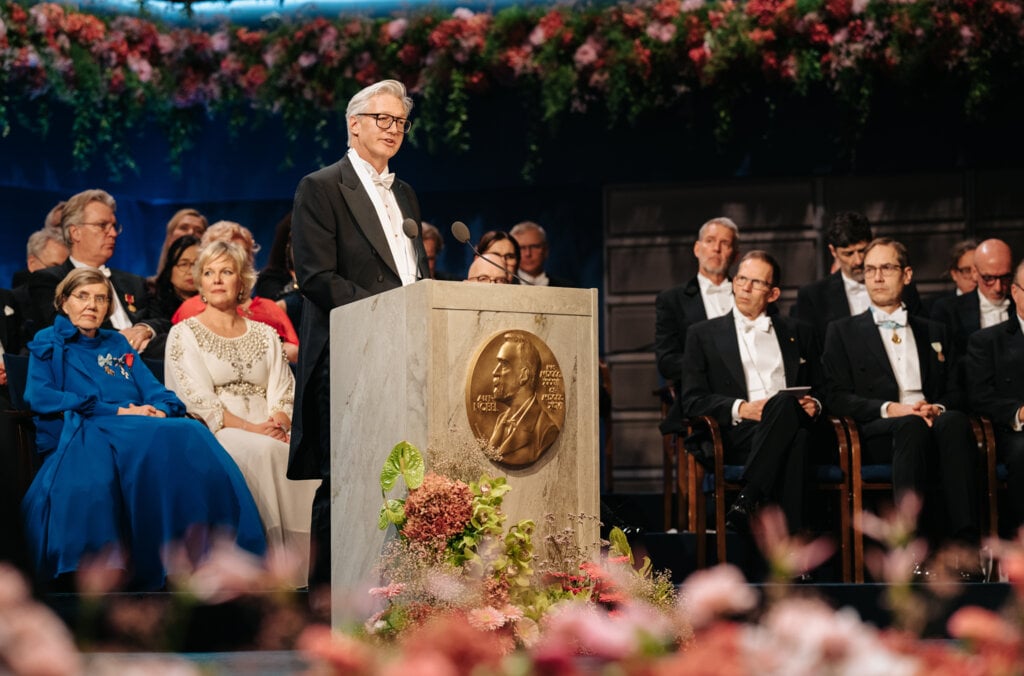Award ceremony speech

English
Swedish
Presentation speech by Professor Jan Teorell, Member of the Committee for the Prize in Economic Sciences in Memory of Alfred Nobel, 10 December 2024.
Your Majesties, Your Royal Highnesses, Esteemed Laureates, Ladies and Gentlemen,
Not very long ago, Sweden was a very poor country run with societal institutions only benefitting a narrow elite. Today, however, Sweden happens to be one of the few lucky countries in the world with both inclusive institutions and economic prosperity. Sweden has it all. So, if you come from a country like Sweden, you might think it obvious that institutions matter for growth. But because we have it all, this is actually far from obvious. How can we be so sure it’s not the other way around – maybe we have these inclusive institutions because of economic prosperity? Or maybe, by some strike of luck in our distant past, some other underlying factor gave us both our institutions and our economic prosperity.
In a very innovative move, this year’s laureates solved this empirical conundrum by studying a huge intervention in human history – the colonisation by Europeans of large parts of the globe starting in the 16th century. By creatively using historical data on how vastly different the societal institutions were that emanated from this colonial experiment, they could provide solid evidence for a causal effect of these institutions on long-run prosperity.
But the laureates’ contribution was not only empirical – in a series of original game-theoretical models, they also explain why institutions are so difficult to change. As it happens, these insights can actually be applied directly to the case of Sweden.
Not far from here in December 1918, the Swedish parliament – on a late Tuesday night just about as cold as this one – adopted an important government bill that secured both female and equal suffrage to the Swedish population.
This particular decision can be seen as the completion of a lengthy process of reforms of both the economic and political institutions of Sweden. But the decision didn’t come lightly. The Conservative elite, whose economic benefits were on the line, fought hard against it. In the end, on that cold December night, they had to accept defeat. Why did they?
The short answer is: to thwart an imminent threat of revolution. The political situation in Stockholm at the time was tense as a bowstring. The year before had seen the Russian revolution, and also in neighbouring Finland, a civil war was raging. Then in early November of 1918, the abdication of the German emperor sent shockwaves through the entire continent – which also reached the Swedish capital.
At this moment, the Swedish military conscripts were effectively disarmed, and an armoured boat with a loyal crew moored in the waters near the Parliament building. People were demonstrating in the streets, almost on a daily basis, and rumours had it that a general strike was imminent.
Yet, the Conservatives understood one crucial thing: they couldn’t sweet-talk themselves out of this situation. Simply promising future welfare reforms for the material benefit of the larger population wouldn’t do the trick. Because everyone understood that, come the day when the situation had calmed down, such promises could easily be broken. The only way to appease the masses was thus to relinquish power itself – by extending the franchise.
This year’s laureates have highlighted the more general importance of this so-called commitment problem for our understanding of why societal institutions persist and – like in Sweden in 1918 – sometimes change.
Professors Acemoglu, Johnson and Robinson,
These contributions are also of practical importance because the large and persistent income gap between the world’s richest and poorest countries has enormous consequences for billions of people living in the world today. And your work proves that supporting democracy and inclusive institutions is an important way forward for reducing this gap.
It is an honour and a privilege for me to convey to you, on behalf of the Royal Swedish Academy of Sciences, our warmest congratulations. May I now please ask you to step forward and receive your prize from His Majesty the King.
